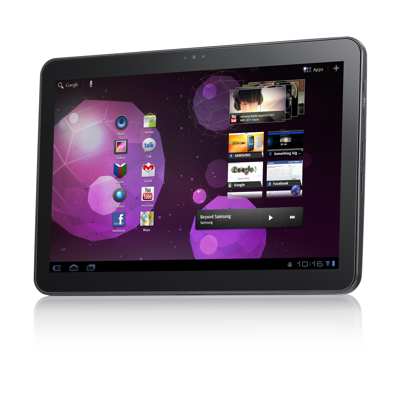| Samsung Hopes to Lift Ban on Galaxy Tab |
| Written by Sue Gee |
| Monday, 27 August 2012 |
|
After last Friday's verdict in the Apple versus Samsung lawsuit, Samsung was quick to file for removal of the injunction against the Galaxy Tab 10.1. There was one decision that went in Samsung's favor in the Apple lawsuit that in all other respects found against Samsung leaving it with over a billion dollars to pay in damages - the jury found that Samsung’s Galaxy Tab 10.1 didn’t violate an Apple design patent related to the iPad.
Back in June Judge Lucy Koh, the presiding judge in the jury trial that concluded on August 23rd, had issued a pre-trial order barring Samsung from selling the Galaxy Tab 10.1 in the United States on the grounds that Apple was likely to win its design patent infringement. In the event the jury's verdict was that Samsung Galaxy Tabs do not infringe the D'889 patent covering design, although Samsung was found to infringe other patents relating to their software which will probably be the basis of Apple's anticipated request for a much wider import ban. Meanwhile, however, Samsung is asking for a speedy reversal of the ban imposed in June and for compensation for an improper injunction, arguing: “The jury found that Samsung‟s Galaxy Tab 10.1 does not infringe the D'889 patent. Since the purported infringement of the D‟889 patent was the only basis for the preliminary injunction, the jury’s finding means that Samsung had a right to sell the Galaxy Tab 10.1 during the period in which the injunction has been in effect. Samsung is therefore entitled to recover damages caused by the improper injunction.” The fact that the jury disagreed with the judge on this particular point does raise a few questions. As law school professor, Michael Risch blogged on madisonion.net: How did the Galaxy Tab escape design patent infringement? This was the only device to be preliminarily enjoined (on appeal no less), and yet it was the one of the few devices to be spared the sledgehammer. And, by the way, it looks an awful lot like an iPad.
But this only adds to the mounting list of questions about the jury's ability to arrive at its verdict in so short amount of time - just 21 hours of deliberation. According to another legal commentator: It would take me more than three days to understand all the terms in the verdict! Much less come to a legally binding decision on all of these separate issues. It seems that despite being given instructions as to how to reach its verdict, the jury short-circuited them. According to The Verge, which provided both real time and extended coverage of the proceedings, the foreman of the jury told a court representative that the jurors had reached a decision without needing the instructions. In an interview with MercuryNews.com, based in San Jose where he comes from jury foreman Velvin Hogan revealed that as a patent holder himself had very forthright views on the issue of patents and that he used his own experience in the jury room. leading the deliberations of the jury. He explained that the jury's first task was to determine if Apple's patents were valid because of Samsung's arguments they were negated by "prior art" in the industry, essentially technology that existed for features such as touch screens before the introduction of the iPhone and thought: 'If this were my patent, could I defend it?' Once I answered that question as yes, it changed how I looked at things." Another juror, Manuel IIagan told CNET that the fact that the foreman had experience of patents made arriving at a verdict easier he also made a couple of telling admissions. With regard to the first patent the jury found it difficult to believe there was no prior art: In fact we skipped that one, so we could go on faster. It was bogging us down. Once you determine that Samsung violated the patents, it's easy to just go down those different [Samsung] products, because it was all the same. Like the trade dress -- once you determine Samsung violated the trade dress, the flat screen with the bezel...then you go down the products to see if it had a bezel. So how come the Galaxy Tab was found not to infringe the iPad's "trade dress"? Hogan told the MercuryNews that he views the Samsung tablet as "distinctively different" and was surprised to learn that Judge Lucy Koh had taken a different position. Hogan said of the verdict: "We wanted to send a message to the industry at large, not just Samsung, that patent infringing is not the right thing to do... We felt like we were 100 percent fair, but we wanted something more than a slap on the wrist." This cavalier attitude may, together with the inconsistencies identified in the Jury's first verdict, and even downright unfairness in the bias towards Apple, may be the ray of hope that Google and the whole of the Android community can use to appeal this ruling that otherwise appears to give Apple the weapon it has been looking for ever since Steve Jobs told his biographer Walter Isaacson that he would go "thermonuclear" in his battle against Android on the grounds of copying his iPhone.
More Information
Related ArticlesApple's Win Over Samsung - What Next
Comments
or email your comment to: comments@i-programmer.info
To be informed about new articles on I Programmer, install the I Programmer Toolbar, subscribe to the RSS feed, follow us on, Twitter, Facebook, Google+ or Linkedin, or sign up for our weekly newsletter.
|
| Last Updated ( Sunday, 23 September 2018 ) |



